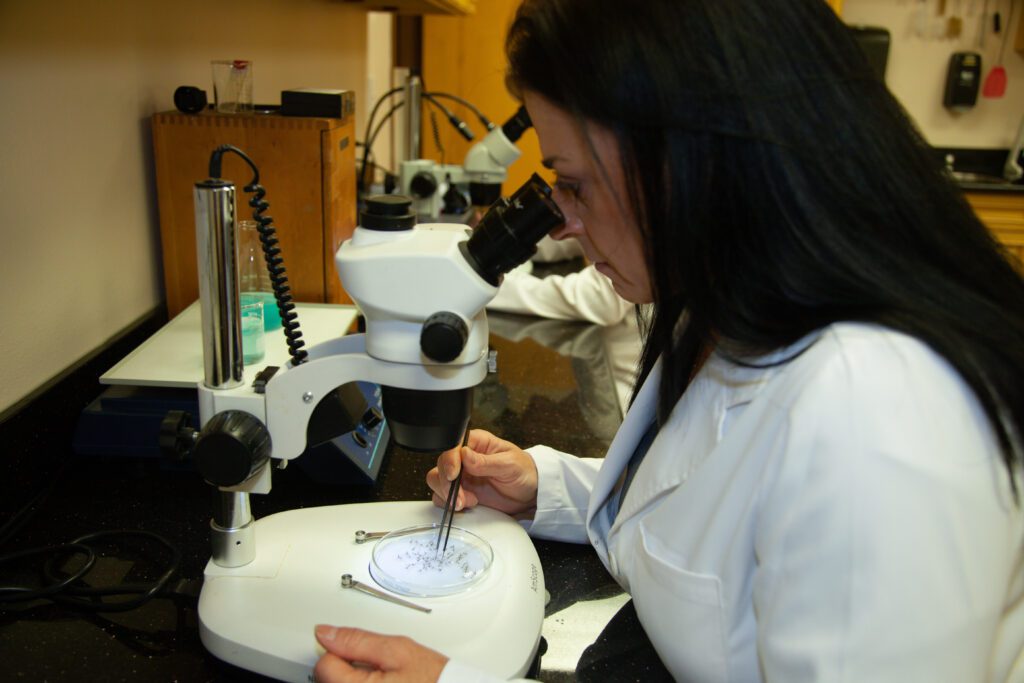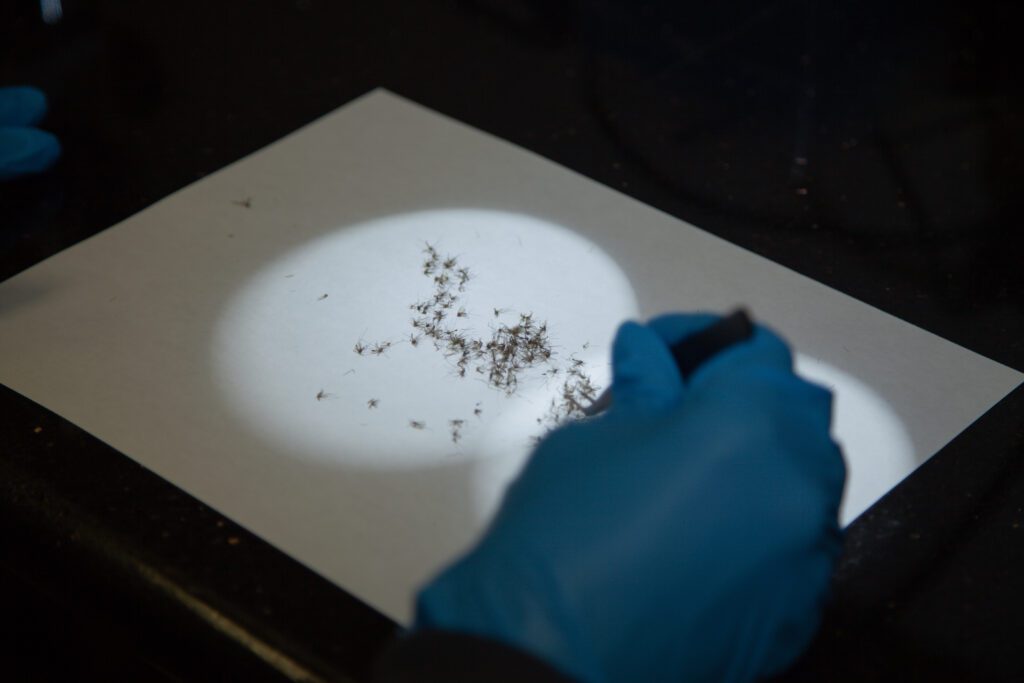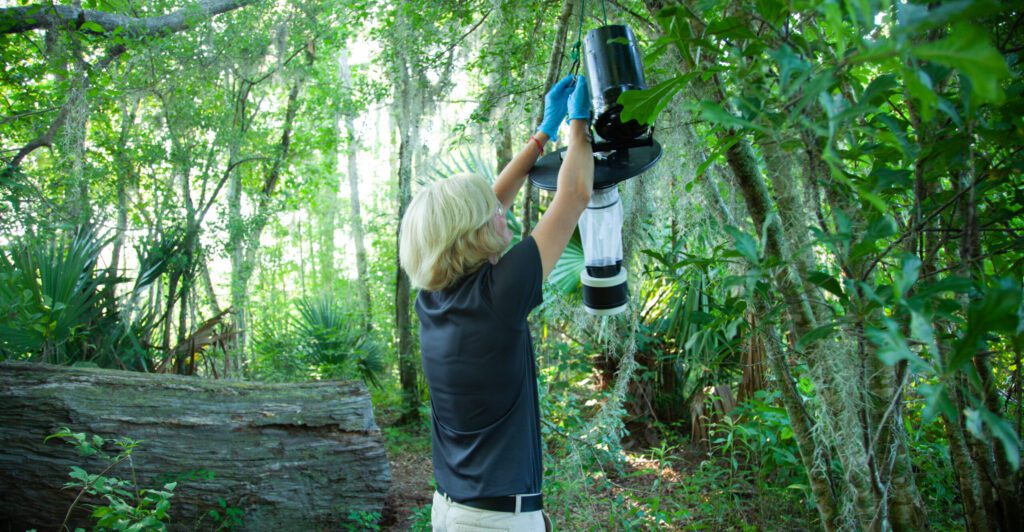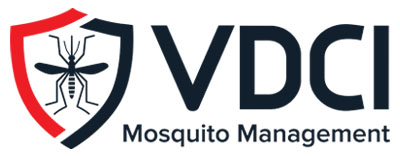How Experts Identify Mosquito Species
Mosquitoes are one of the most diverse groups of insects in the world, with over 3,500 species identified globally. In the United States alone, there are approximately 200 mosquito species, each with its own unique behaviors, habitats, and potential public health impacts. That is why understanding the specific types of mosquitoes is crucial for effective management, as certain species are known carriers of diseases such as West Nile virus, Eastern equine encephalitis, and dengue fever. By accurately identifying these insects, government officials can implement targeted strategies to help mitigate the risks mosquitoes pose. Learn how our expert entomologists at VDCI identify mosquito species and use data to enhance our control efforts.

Types of Mosquitoes In The U.S.
The three most common mosquito genera in the United States are Culex, Anopheles, and Aedes. Culex mosquitoes, often brown or gray in color, are known to vector West Nile virus and St. Louis encephalitis. They are commonly found in urban and suburban areas, especially around stagnant water like ditches and pools. Anopheles mosquitoes, which are typically characterized by their long legs, spotted wings and pale bodies, are most well-known for being the primary vectors of malaria. These mosquitoes prefer to breed in clean, freshwater sources, such as ponds and marshes. They are prevalent in areas with a warm climate and are found throughout the United States. Aedes mosquitoes are often characterized by their striking black, yellow and white markings. They are usually aggressive daytime feeders and can be found in a variety of environments, from urban areas to rural locations. Aedes mosquitoes, specifically Aedes aegypti, are known for transmitting several diseases, including dengue fever, Zika virus, and chikungunya. Their ability to breed in small pools of water, such as in flower pots or discarded tires, contributes to their widespread presence in many regions across the country.

Why Mosquito Identification Matters For Control
Proper mosquito identification is crucial for managing an effective mosquito control program. Some mosquito species are diurnal, active during the day, while others are nocturnal, becoming active and feeding at night. This variation in activity patterns significantly determines when insecticide applications are optimal, thereby ensuring the insecticide targets the specific mosquito species for control. Moreover, using different application strategies to target mosquitoes when they are resting or inactive provides additional advantages for their control. Following these control strategies reduces the overuse of insecticide products by only performing applications when mosquitoes are most active or present at a particular location. This also prevents or reduces the development of insecticide resistance in local mosquito species.
In addition, certain mosquito species are vectors of diseases, while others may not carry any pathogens at all. Understanding whether the mosquito population in your area is capable of transmitting diseases will lead to a more comprehensive mosquito management program, including educating citizens on potential disease risks and personal protection strategies.
Identifying Mosquitoes In The Lab
Entomologists collect mosquito species through various collection methods, primarily utilizing specialized surveillance traps designed to attract and capture these insects. These traps can vary in design, color, and bait attractants, ranging from CO2-based traps that lure mosquitoes using carbon dioxide emissions to light traps that use ultraviolet light to gravid traps that utilize organically rich water to attract egg-laying Culex mosquitoes. Once collected, mosquitoes are taken to a laboratory where entomologists carry out detailed identification and additional testing, including insecticide resistance and disease testing. In the lab, experts use mosquito keys or genetic analysis to accurately identify the type of mosquito species. Among the key features and markings that experts examine are DNA sequences, head shape, body size, wing patterns, and coloration. This thorough approach gathers essential data about local mosquito populations that professionals can use to guide a more effective mosquito management program.

Taking Mosquito Identification One Step Further
The accurate identification of mosquito species plays a crucial role in any Integrated Mosquito Management program. A comprehensive mosquito control program that encompasses identification, monitoring, targeted control measures, and public education can help protect public health and manage mosquito populations from becoming unmanageable. Understanding the specific species present in a given area allows for targeted interventions that are tailored to the biological and ecological characteristics of those specific mosquito species. By using data to drive decision-making, control measures are more efficient and effective. Contact your local mosquito management professional to learn how to incorporate regular data collection into your mosquito management program.
Contact Our Experts
Complete the form below or call us at 800-413-4445 to speak to an expert about your mosquito management needs.
 Since 1992, Vector Disease Control International (VDCI) has taken pride in providing municipalities, mosquito abatement districts, industrial sites, planned communities, homeowners associations, and golf courses with the tools they need to run effective mosquito control programs. We are determined to protect the public health of the communities in which we operate. Our mosquito control professionals have over 100 years of combined experience in the field of public health, specifically vector disease control. We strive to provide the most effective and scientifically sound mosquito surveillance and control programs possible based on an Integrated Mosquito Management approach recommended by the American Mosquito Control Association (AMCA) and Centers for Disease Control and Prevention (CDC). VDCI is the only company in the country that can manage all aspects of an integrated mosquito management program, from surveillance to disease testing to aerial application in emergency situations.
Since 1992, Vector Disease Control International (VDCI) has taken pride in providing municipalities, mosquito abatement districts, industrial sites, planned communities, homeowners associations, and golf courses with the tools they need to run effective mosquito control programs. We are determined to protect the public health of the communities in which we operate. Our mosquito control professionals have over 100 years of combined experience in the field of public health, specifically vector disease control. We strive to provide the most effective and scientifically sound mosquito surveillance and control programs possible based on an Integrated Mosquito Management approach recommended by the American Mosquito Control Association (AMCA) and Centers for Disease Control and Prevention (CDC). VDCI is the only company in the country that can manage all aspects of an integrated mosquito management program, from surveillance to disease testing to aerial application in emergency situations.

